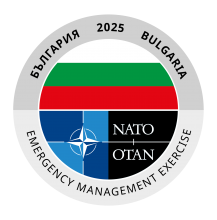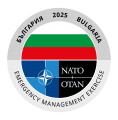SCENARIO
LEAD-IN SCENARIO FOR THE NATO EADRCC EMERGENCY MANAGEMENT FIELD AND COMMAND POST EXERCISE “BULGARIA 2025”
On 6 September 2025 at 06:19 GMT, a 7.2 magnitude earthquake occured in Bulgaria causing severe damage to the Municipality of Montana (140km north of Sofia) and the region. Strong aftershocks have been recorded and are causing chaos. A low pressure area is currently developing over western parts of the region of Montana; it is expected to expand strongly the next two days. Therefore, the national Met Office issued severe weather (heavy rain) warnings through the BG-Alert warning system. The earthquake and its aftershocks caused major floods and landslides in the area. The aftershocks also caused significant damage in the municipalities of Montana, Erden and Dolno Cerovene. About 120,000 people are affected. Numerous buildings have collapsed, including some hospitals in these municipalities. Operational hospitals in the area are working at the limit of their capabilities Urban critical infrastructure (water, gas, electricity and telecommunications) is severely affected. Road transport is restricted in certain zones of the affected area. There are major traffic jams on the (unrestricted) roads, blocking the road network in the affected area, resulting in a heightened risk for serious road accidents with many casualties. The industrial area its critical infrastructure and factories around Montana are also affected: the main chemical plant in the city creates a danger for the population. Another chemical plant, in the industrial zone, has workers buried under the rubble and several others are missing. The earthquake activated a large landslide in the area of the Ogosta dam causing destruction along the coast and lost persons.
OBJECTIVES
The primary objectives of NATO Emergency Management Exercise “BULGARIA 2025” are:
- Build resilience and interoperability through improved disaster preparedness,
planning, prevention and response, and strengthen the capability of NATO Allies
and partners to manage complex emergencies and respond to security challenges,
including climate change and hybrid threats.
- Exchange of knowledge and good practices on the coordination and response
capacities of the participating states and organizations.
- Build up cooperation between civilian and military actors in responding to a range of crises.
- Encourage cooperation between Allies and partners, and with NATO, including by on facilitation of vital civil cross-border transport.
- Contribute to NATO’s defence capacity-building support to partners.
- Test and improve Bulgaria’s host nation support capacities.
- Send a public signal to audiences in Allied and partner countries about the value of cooperation through NATO.
The specific exercise objectives are shaped by the participating countries and organisations, in line with their needs and training priorities. The planning conferences and exercise preparation work are essential for potential participants to share their needs and priorities.
The exercise scenario is developed to meet all participants’ objectives. In line with those, the scenario can include different disciplines, e.g. search and rescue, response to Chemical, Biological, Radiological and Nuclear attacks, water rescue, large scale population movements, etc.
The details of participation, scenarios and matching training objectives to realistic challenges are ironed out during planning conferences ahead of the exercise.
DISCIPLINES
The exercise will feature a range of emergency response disciplines, including:
- Civil-Military Cooperation
- Host nation support
- Urban search and rescue (USAR), including cultural heritage preservation, and rope rescue
- Water search and rescue (WSAR)
- Chemical, radiological and nuclear incident management
- Emergency medical response, including EMT-1 (fixed and rolling) and EMT-2 capabilities
- Information threats and media relations
- Possible other participant-initiated disciplines
CONDUCT
The value of the exercise extends beyond operational training. It offers a platform for knowledge sharing, enabling participants to gain insights into effective emergency management strategies through shared experiences and expertise. By strengthening cooperation among national and international entities, the exercise enhances interoperability and readiness for disasters. The exercise also supports resilience building by helping participating nations meet NATO’s Baseline Requirements and fosters regional collaboration to manage cross-border emergencies.






